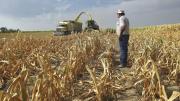By May, snow and ice may seem a distant memory, but the economic effects of an unusual winter still linger. Frequent snowstorms in the eastern United States are estimated to have cost the economy tens of billions of dollars as productivity slowed and both consumers and workers stayed home. Meanwhile, the season’s record-high temperatures in the American West intensified a lengthy drought, which will increase the risk of wildfires this summer.
Weather has diverse and far-reaching effects, and—given realized and anticipated climate change—there is growing interest in predicting how rising temperatures will affect global economies. In a review in the Journal of Economic Literature, Junior Fellow Melissa Dell (who becomes an assistant professor of economics on July 1) and two coauthors summarized the findings of this rapidly growing field of research.
Curiosity about climate is nothing new. The French philosopher Montesquieu argued at length about climate’s effect on human temperament and, thereby, on a region’s politics and economics: “The inhabitants of warm countries are, like old men, timorous; the people in cold countries are, like young men, brave,” he wrote at one point. But isolating the effect of climate has always been difficult. Dell and her collaborators found in 2009, for instance, that countries that are one degree Celsius warmer are, on average, 8.5 percent poorer per capita. “In the raw data, we see this huge correlation,” she says. “We want to understand how much of that is actually due to a causal effect of temperature.”
Recent studies try to discern temperature effects by observing the impact of weather fluctuations within a single region. “Within one place, you have multiple observations and compare within that place over time,” she explains. A harsh winter, for instance, is an opportunity to observe the effects of colder temperatures. “You use that variation instead of comparing, say, Boston to California.”
“Weather has a surprisingly broad number of impacts across different sectors of the economy,” says Dell. The agricultural damage done by a heat wave or drought is easy to imagine, but the literature suggests effects on manufacturing, crime rates, and health as well. Some correlations may have complex roots: higher temperatures may be linked to more civil unrest, for example, because crop failures make it less costly for farmers to protest, or because the stresses of extreme weather highlight government ineptitude. Other findings seem surprisingly straightforward: for instance, both laboratory studies of individual workers and broad analyses of economic output have found that productivity is lower on hot days. “I think that because we mostly have air conditioning in the United States, it’s very easy to forget how big a deal this is,” Dell observes. “Before air conditioning, when it was above 90 degrees, the federal government would just close down.”
Predicting the economic consequences of climate change is especially relevant as governments consider policies like a carbon tax, but is far from easy. “We don’t even have a great sense of how large the climate effects are going to be,” let alone their economic impact, Dell says. She also points out the difficulty of predicting the impact of potentially large changes in climate using data collected from smaller fluctuations in weather. Above certain thresholds, for instance, even minor temperature changes have disproportionately large effects as crops begin to fail. Moreover, resources like water reservoirs that buffer the impact of short-term fluctuations may be depleted by more persistent climate change.
A major question now is how well economies can adapt. Farmers, for instance, might switch to more heat-tolerant crops, but most analyses so far have found limited avenues for heading off long-term effects. Critically for international development, says Dell, the impacts are particularly large on poor countries, which tend to depend more heavily on agriculture. Weather shocks like droughts or storms are also known to strongly slow their growth rate, suggesting that climate change could significantly impede long-term development.
Many areas for further research remain, Dell acknowledges, but evidence from these recent studies has an undeniable trend. “Even fairly modest changes have potentially large impacts,” she says. “We don’t know the exact magnitudes, but we know enough to say that, barring major changes in our capacities to adapt, we’ll see significant negative effects.”









